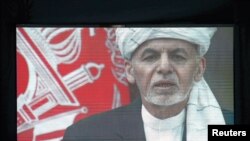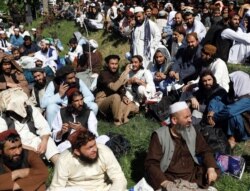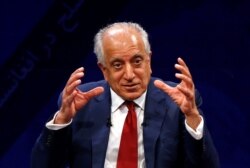Afghan President Ashraf Ghani announced Thursday that his government will soon release remaining Taliban prisoners to help a U.S.-led peace process remain on course.
Ghani told a forum hosted jointly by the Washington-based Atlantic Council’s South Asia Center and the United States Institute of Peace that 3,000 insurgent inmates have already been set free.
“My colleagues and I have made the decision to release an additional 2,000 prisoners within a very short period. We will announce the date soon,” the Afghan president said.
Ghani noted that Taliban members were in Kabul identifying their prisoners being released from jails in exchange for 1,000 Afghan security personnel being held by the insurgents.
The prisoner swap, stipulated in the agreement the U.S. sealed with the Taliban in February, must be completed for building mutual confidence before Afghanistan’s warring sides open long-awaited peace talks.
“I think now we are on course, and next week we should be able to inform the world of the next step,” said Ghani, who started his second term in March after a controversy-marred presidential election.
The Taliban have so far released about 550 detainees from jails under insurgent-controlled areas in Afghanistan.
'Positive step'
A spokesman for the insurgency hailed Ghani’s announcement as a “positive step” and marked good progress. It would pave the way for commencement of intra-Afghan negotiations, tweeted Suhail Shaheen.
Shaheen said the Taliban are also committed to the prisoner exchange and underlined his group’s “preparedness to start intra-Afghan negotiations within [a] week as soon as the process of 5,000 [Taliban] prisoners’ release is completed in line with the [insurgent] list already delivered.”
U.S. envoy for Afghanistan reconciliation Zalmay Khalilzad, who negotiated and signed the deal with the Taliban, hailed the progress in the prisoner swap. In a series of tweets, Khalilzad also welcomed the Taliban’s announcement that they were ready to enter into peace talks, saying it was a commitment outlined in the agreement.
“We are closer to the goal of IAN [intra-Afghan negotiations] than ever before. All sides must work to get to the negotiations table ASAP and prevent spoilers from undermining the process & betraying the hopes and yearning of Afghan people for peace,” said the U.S. envoy.
Ghani said, however, that the Taliban have not been transparent about how many Afghan prisoners they still hold.
“The number keeps shifting. We need clarity regarding the fate of those that are with them and assurance that the last person remaining with them is released,” he said.
The Afghan president also expressed concerns over heightened insurgent violence and again called on the Taliban to declare a "humanitarian cease-fire” to allow health workers to deal with the coronavirus outbreak in Afghanistan.
Late last month, the two adversaries observed a temporary cease-fire during the three-day annual Eid al-Fitr festivities marking the end of the fasting month of Ramadan. Ghani, however, said insurgent violence has since intensified.
“The casualty figures still average around 60 to 70 a day. The number of fatalities unfortunately are averaging 30,” Ghani noted. He did not elaborate.
The Taliban have carried out major attacks against Afghan security forces in recent weeks, killing dozens of them. The stepped-up violence has also caused hundreds of civilian casualties.
Taliban officials argue, however, that a cease-fire will be on the agenda when intra-Afghan talks begin to discuss internal political disputes.
The U.S.-Taliban agreement requires all American and coalition forces to leave Afghanistan by July 2021, ending America’s longest overseas military intervention. In return, the pact outlines the Taliban’s counterterrorism assurances and political reconciliation with other Afghan factions.






